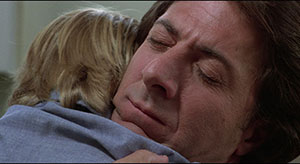
If you want to end your film on an affecting up beat, you’re going to need to precede that with a very significant down beat. (Or vice versa).
We’re not in the word business. We’re in the emotion business
Every writer worships words and screenwriters are no exception. But, screenwriting is a weird branch of the art in that only about half of the words we put on the page get heard (the dialogue) and the rest (the big print) is neither seen nor heard—by the audience at least.
Though we’re happy sometimes when reading literature or watching a play to simply luxuriate in the wordcraft of the author, that is less often successful in the cinema and something to be wary of if you’re making the crossover into film from novels, plays or poetry. If you get preoccupied with the words – with the bricks – however beautiful they may be, you can lose sight of the building and your screenplay can end up looking like the carport your next door neighbour knocked up one Saturday afternoon with his mates over a couple of slabs of VB*.
While the best screenwriters tend also to be great wordsmiths, I don’t think that we are fundamentally in the word business. Words are not the end product. It’s not enough that what you put on the page sounds good to your ear. The words ultimately are only there to serve a higher goal. What is that goal?
You could say that the words are the servants of the story but even the story has to answer to a higher purpose. As screenwriters, we aren’t ultimately trying conjure pretty phrases, or build a captivating story. Everything that we do – for me at least – is directed towards one goal …
… to move the audience.
Does your screenplay do that?
Moving implies a shift. Do you have one?
It might seem obvious but if you want to move the audience you need to shift their emotions – from one state to another.
And, the bigger that shift – as long as it’s organic to the story and not some sort of contrived shock – the more the audience is moved at the climax.
So, if you want to end your story on an upbeat – as you do in the classic restorative drama – you can’t hope to move the audience as you would like if that Ecstasy is not preceded by some Agony.
In Dead Poets Society, the elation we feel at Todd’s courageous stand is emphasised because we are coming off the extraordinary low of Neil’s tragic death and the students’ betrayal of Mr Keating (Robin Williams).
In Cuckoo’s Nest, the incredible sense of release we feel when Chief launches that water fixture through the pane of glass and escapes is counterpointed by the preceding death of R.P. McMurphy (Jack Nicholson).
In Kramer vs Kramer, Ted (Dustin Hoffman) ultimately gains custody of his son, Billy, but only after we suffer with him the gut-wrenching grief of losing him in the court battle.
Similarly, if you are going to have a tragic climax, you need to set it up with a false victory.
In the Lives of Others, Wiesler seems to have saved the day by removing the typewriter and sparing the playwright, only for the guilt-stricken actress-girlfriend to unnecessarily take her life. Ecstasy to Agony in a split-second. And the emotion pours out.
In the Godfather, Michael Corleone orchestrates the deaths of all who have opposed his family – which gives us a primal sense of triumph – only to shut the door on the wife who loved him – down we go.
In Juno, the eponymous hero reunites with the adorably dorky Bleeker only to surrender their child because they still feel they are children themselves. (The script is much more affecting than the film, for reasons that I explain in this earlier post).
This need to shift the audience at the climax, most typically, from a very big low to a very big high leads me to my next post …
Great Endings Step 8: What does your hero sacrifice?
Catch the entire Great Endings series of posts here
Join the Cracking Yarns mailing list
Learn about our Screenwriting Courses
Learn about our Online Screenwriting Courses
Learn about our Free Screenwriting Webinars
Learn about our Script Assessment options
Subscribe to the Cracking Yarns YouTube channel
* VB – Victoria Bitter: Australia’s highest selling beer